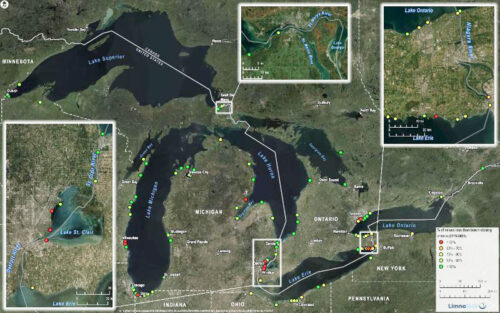Health Professionals Advisory Board seeks to improve Great Lakes microbial water quality testing

This summer, many families will find relaxation in the sunshine while swimming, boating, fishing and playing around the thousands of beaches across the Great Lakes’ more than 10,500 miles of freshwater coastline. But some may find themselves instead under the fluorescent lights of a doctor’s office, explaining tummy trouble, itchy rashes or other uncomfortable ailments caused by microorganisms like viruses, lurking in the waters. Others may decline taking a dip where the shores are overgrown with algal blooms that resemble pea soup more than fresh water.
The International Joint Commission Health Professionals Advisory Board’s Great Lakes Microbial Water Quality Assessment project (https://tinyurl.com/2maw6e4h) reports that we can and should improve the way we test for these irritating microscopic threats to our shared waters and our health.
The US Environmental Protection Agency’s latest report on 2023 beach conditions shows that one third of the 5,000+ monitored beaches nationwide had at least one advisory or closing, impacting almost 10 percent of beach days in 2023. Across the United States, swimming, paddling, boating and fishing are estimated to account for more than 90 million cases of gastrointestinal, respiratory, ear, eye, and skin-related illnesses per year, with an annual cost of $2.9 billion.
“It’s not just the issue of occasional stomach aches that makes Great Lakes water quality relevant to public health,” said McMaster University Professor of Biology Dr. Tom Edge, who serves as the board’s Canadian co-chair.
“The microbial water quality of the Great Lakes can change rapidly, impacting the tens of millions of people who rely on the ecosystem as a safe source of drinking water and recreational activities,” he said.
Many issues are related to large untreated sewage releases in the Great Lakes, such as waterborne diseases from recreational waters, and boil water advisories for treated drinking water. There are also emerging concerns like harmful algal blooms, taste and odor problems, and the spread of antimicrobial resistance.
Recent research from the board found an uptick in stomach illnesses in Great Lake cities from treated tap water when extreme rain comes after a long dry spell. The board also summarized the state of the science about the health effects of toxic algal blooms.
“More and more, climate change and extreme weather events, and aging wastewater and drinking water infrastructure are increasing the urgency and severity of water quality threats to public health. These types of concerns are expected to continue to adversely impact human health and local economies around the Great Lakes into the future,” Dr. Edge said.
Before throwing in the towel and ditching the beach, apps like Swim Guide serve up the latest status of advisories and closures for monitored beaches around the world. And local news will share alerts from public health officials if there are boil water advisories for affected tap water.
“While we have access to water quality websites on our smartphones anywhere at any time, the reality is that the water quality monitoring itself is not nearly as modern,” said Michigan State University Professor and Homer Nowlin Chair of Water Research Dr. Joan Rose, who is the board’s United States co-chair.
“A beach advisory or boil water advisory issued today is based on water that was collected and tested yesterday, if not earlier. The process for monitoring water quality relies on slow and outdated tools like microscopes, petri dishes and other old-fashioned methods to measure and track the causes of these and other water quality threats to public health,” said Dr. Rose.
“New technologies, like molecular and genomic tools, not only provide results faster, but can also help identify and track the source of these microscopic threats. Knowing whether the problem is from geese and gull droppings or from a pipe leaking sewage helps guide decisions on how to fix the problem and, where possible, to prevent it from happening again,” she said.
Modernizing water quality monitoring and assessment is imperative to protect public health. With this goal, the board’s Great Lakes Microbial Water Quality Assessment project is standing up a pilot effort to deploy new and innovative technologies with the help of experts from Canada, the United States, First Nations and Tribes.
This is not the first time the International Joint Commission provided leadership on a basinwide study assessing water quality threats to public health in the Great Lakes. Shortly after Canada and the United States created the Commission through the 1909 Boundary Waters Treaty, it conducted groundbreaking research and published a 1918 study that tested water quality across the Great Lakes in Canada and the United States. The Commission’s study concluded that untreated sewage pollution was the cause of the “abnormal prevalence of typhoid fever” and other sanitation and health threats.
A century later, the Health Professionals Advisory Board is positioning the Commission once again as a leader guiding a basinwide effort to analyze and map the linkages of Great Lakes water quality and human health.
This project has been in the works since 2019; the board first scoped out the general feasibility of such a study in our 2021 report, and subsequent efforts to define the parameters of a large-scale water quality assessment study culminated in a report published last year. Now, the board is working to develop plans for a method validation study and pilot study for what would eventually be the realization of the full-scale Great Lakes Microbial Water Quality Assessment.
The Health Professionals Advisory Board is now setting up a steering committee of experts from Canada, the United States, First Nations and Tribes, that will establish shared objectives, strategies, and funding options for implementing the full study. There will also be a technical working group to conduct detailed scientific planning and coordination of interlaboratory round robin validation studies, a pilot demonstration study, and eventual roll-out of the large basinwide study.
“There is an urgent need to modernize and adopt the best technologies possible to protect human health. We need to tap into and coordinate the scientific expertise around the Great Lakes to do this. This IJC board is actively recruiting professionals to contribute to this multi-national, multi-discipline effort” said Dr. Edge.
Interested experts and laboratories can go to https://www.ijc.org/en/contact/contact_the_health_professionals to inquire about participating in the Great Lakes Microbial Water Quality Assessment project.
Provided information



